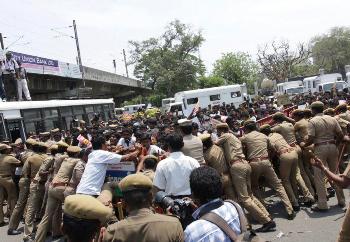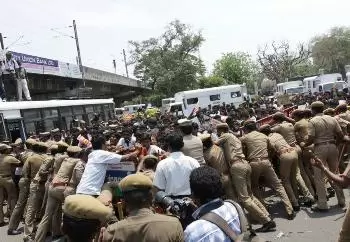Why for some Eelam is anathema
30-March-2013

Tamil Nadu Chief Minister J Jayalalithaa's backing for the demand seeking a referendum on Eelam is a timely and welcome decision.
Taking into consideration the demands of the still agitating students, the CM has demanded that the Centre take steps for conducting a referendum among the Sri Lankan and Diaspora Tamils on formation of Eelam - an independent Tamil nation carved out of Sri Lanka.
 |
|
Jayalalithaa backed the TN students’ demand for referendum on Eelam
|
What has been the heartbeat of every Dravidian Tamil, has taken a long time for mainstream political parties in the state to take note of and articulate in an official language.
But even this late declaration is met only with opposition from north Indian as well as South Indian Brahmin media personnel who these days are hardly able to disguise their anxiety against a free Tamil Eelam.
The objection raised against the CM's announcement not only smacks of double standards but also a wish to see the voices of those other than their own, suppressed ruthlessly everywhere.
"Can a state Assembly make such demands? Can it dictate a foreign policy stand?" asks a news anchor in an English TV channel, soon after the Tamil Nadu Assembly passed a unanimous resolution on the Eelam referendum.
The anchor’s ire was also directed at the CM's statement that India must stop addressing Sri Lanka as a "friendly nation."
In a late night Tamil show "Naerpada pesu" (Honestly Speaking) on the same day, if a congressman running out of ideas to justify the Centre's stand on Sri Lanka shouted down the news anchor and called the news channel names, media friends on the debate offered their biased views on Eelam.
For long New Delhi's centre-based politicking has been kept on a pedestal by an exclusively Brahminical media, while the state's politicking especially when it contradicts and questions the basic premises of the centre's stand, as in the Eelam case, gets the untouchable treatment.
The question is whether a nation exists divorced from a state government, its revenue, or taxpayers of the state.
So what explains this media anxiety that veers towards brazen denial of democratic rights and which reflects an eagerness to prejudice and forestall meaningful debates on an issue in the Parliament and outside?
If the Indian corporate media had its way, everyone would have a strong opinion on Tamil Eelam except those affected.
So what is it that scares the living daylights out of this elitist class, be they bureaucrats, policy makers or journalists, notably led by those speaking a different and sanskritized version of Tamil, at the prospect of an independent Eelam?
The Indian government story of the China monster and the Pakistani fox are for kids hooked on fairy tales.
In media opinions or debates there is hardly genuine ignorance. And that is hard to address.
The present debate or rather non-debate in the rest of India on free Eelam is indeed a unique India story – like the other familiar story of caste politics.
Emotions are running high in Tamil Nadu. Students are on the streets for weeks and have even threatened to launch a non-cooperation movement against the Centre.
But New Delhi is ignoring the sentiments on the streets at its own peril.
When Chennai tells New Delhi to stop doing business with Colombo, Delhi does the opposite. It signs a new trade agreement and also rejects the state Assembly’s Eelam resolution.
An abuser always resorts to more abuse when faced with loss of power. But that's his final shot at triumph before he loses completely.
(Radhika Giri is a senior journalist based in Chennai)
Sridhar Vembu Resigns as Zoho CEO; Shailesh Kumar Davey Appointed New Group CEO
Delhi Jal Board Refutes Arvind Kejriwal’s 'Poison in Water' Allegations
IIT Madras Gears Up for Global Hyperloop High-Speed Train Challenge
Uttarakhand To Create History By Implementing UCC Today
Trump Imposes 25 Pc Tariffs On Colombia For Refusing Deportation Flights









